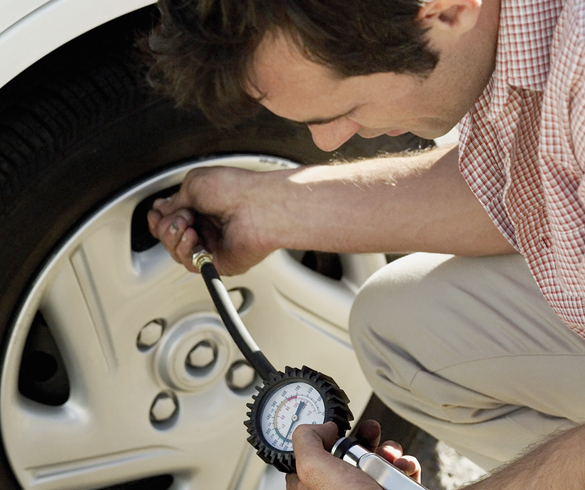
Stay Safe on the Road this Summer
5 warm weather tire safety tips
When it comes to staying safe on the roads – whether you’re traveling cross-country or just across town – routinely checking the condition of your tires can be imperative. While variables like road and weather conditions can also impact safety, it’s important to remember your tires are the only thing between your vehicle and the road.
During the summer months, high heat and hot roadways combined with normal rolling, turning and braking contribute to potential safety hazards, particularly on worn or improperly inflated tires. Before you hit the road this summer, consider these tips from the experts at your neighborhood Discount Tire store to help keep you safe.
- Check your tread. Tread depth refers to the amount of sufficient tread on a tire, which impacts handling, traction and your vehicle’s safe stopping distance. As tires wear and tread depth is reduced, their ability to perform in adverse conditions such as rain can be compromised. While most new cars start with 11/32 inch tread, you can use the penny test to check your tread depth at home by sticking a penny upside-down in a tread groove. If Lincoln’s entire head is visible, your tread is worn beyond what tire experts recommend as safe – less than 4/32 inch – and it’s time to replace your tires.
- Accurately measure pressure. Low tire pressure can lead to poor handling and gas mileage, excessive wear and the possibility of tire failure. Remember to check your tire pressure at least once a month, especially before any long-distance trips, as the impacts of bumps and turns from everyday use can lead to normal air loss. For the most accurate reading, check your tires when the car is cool as driving can heat up the tires and lead to an inaccurate reading. You can find the manufacturer’s recommended tire pressure on a sticker in your car’s door jamb or in your owner’s manual. If you need assistance, look for a store like Discount Tire, which offers complimentary air checks and tire safety inspections.
- Rotate often. Tires wear differently depending on their location on the vehicle. Routinely rotating your tires spreads wear evenly, which helps maximize their handling, traction and stopping capabilities. To increase longevity and keep your ride as smooth as possible, rotate your tires every 6,000 miles or earlier if irregular or uneven wear develops.
- Inspect your trunk. Some newer vehicles now include tire inflation kits complete with puncture-coating sealants and air compressors, or run-flat tires that allow for continued driving with no air pressure for a short period of time rather than a traditional spare tire. Check your trunk to see what your vehicle contains and make sure you have a roadside assistance plan in case of emergency.
- Avoid overloading. Overloading your vehicle can have a similar impact on your tires as driving on underinflated tires. The combination of warm roads and overloading, which is common during summer travel season, can lead to your tires potentially overheating and failing. Before loading your car, check the manufacturer’s loading recommendation, which can be found in the owner’s manual or on the door jamb sticker.
For more tire safety tips, to locate a store near you or schedule a service appointment, visit discounttire.com.
Source:
Discount Tire






























